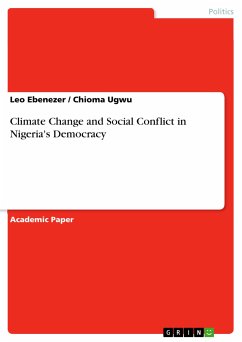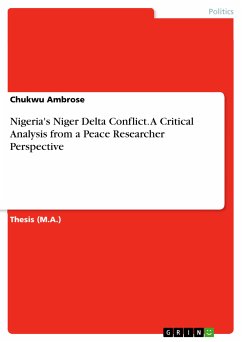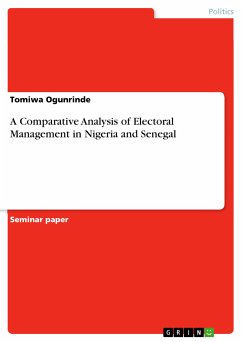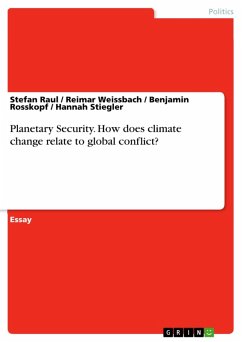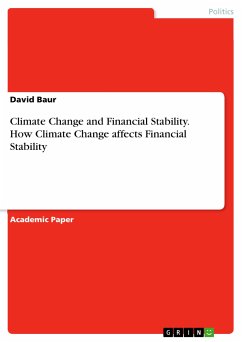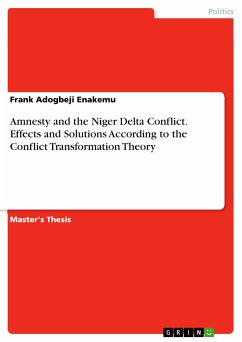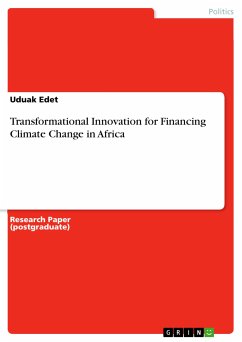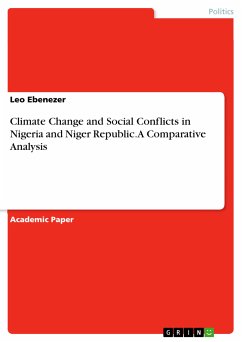
Climate Change and Social Conflicts in Nigeria and Niger Republic. A Comparative Analysis (eBook, PDF)
Sofort per Download lieferbar
Statt: 17,95 €**
15,99 €
inkl. MwSt. und vom Verlag festgesetzt.
**Preis der gedruckten Ausgabe (Broschiertes Buch)
Alle Infos zum eBook verschenkenWeitere Ausgaben:

PAYBACK Punkte
0 °P sammeln!
Academic Paper from the year 2021 in the subject Politics - International Politics - Region: Africa, grade: 2.5, , course: Peace and Conflict Resolution in Africa, language: English, abstract: This research examines the impact of climate change on societal conflict in Nigeria and Niger Republic. The objectives are to determine the impact of climate change on social conflict in Nigeria and Niger Republic; identify the progenitors and victims of climate change in Nigeria and Niger Republic; examine citizens' perceptions on nationalist identities; and proffer solutions through mitigation and adap...
Academic Paper from the year 2021 in the subject Politics - International Politics - Region: Africa, grade: 2.5, , course: Peace and Conflict Resolution in Africa, language: English, abstract: This research examines the impact of climate change on societal conflict in Nigeria and Niger Republic. The objectives are to determine the impact of climate change on social conflict in Nigeria and Niger Republic; identify the progenitors and victims of climate change in Nigeria and Niger Republic; examine citizens' perceptions on nationalist identities; and proffer solutions through mitigation and adaption strategies for mutual interdependence. Two key areas of conflict necessitated this research. First, subnational agitations for environmental protection arising from environmental degradation, pollution, gas flaring, biodiversity depletion and destruction of the aquatic habitat which tends to undermine national unity. Second, farmers/herders clashes occasioned by deforestation and desertification of the Sahel region and the Lake Chad basin which undermine national security, peace and sustainable development in both countries. The anger of nature (astronomical) against humans (anthropogenic) on its endowments, and the reactive consequences of nature on how human beings and their agents have abused and destroyed the material/mineral resources freely provided by nature for man's economic and social sustainability when not addressed drastically would negatively impact on subnational and interstate disharmony. The social conflict analytical approach, the Social Conflict Theory and the Anthropogenic Global Warming Theory are used to theoretically justify potentials of these social conflicts in redirecting the narratives of national unity and ethnic identity in both countries. This study uses descriptive research design and content analysis. The data employed for the study will be gathered from secondary sources. This work observed the devastating nature of social conflicts arising from climate change, especially in the Middle Belt in Nigeria, by headers/farmers crisis. It attributed it to lack of understanding, intolerance, accommodation and burden sharing. It enjoined citizens to stop religious and politicization of the crisis and give peace a chance for unity, solidarity and mutual co-existence in both countries.
Dieser Download kann aus rechtlichen Gründen nur mit Rechnungsadresse in A, B, BG, CY, CZ, D, DK, EW, E, FIN, F, GR, HR, H, IRL, I, LT, L, LR, M, NL, PL, P, R, S, SLO, SK ausgeliefert werden.




